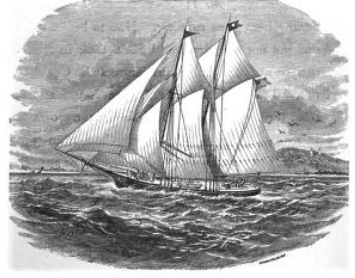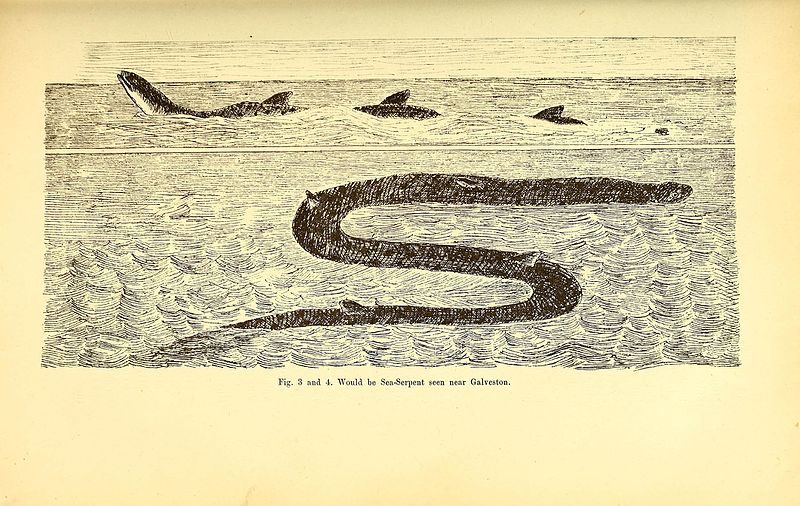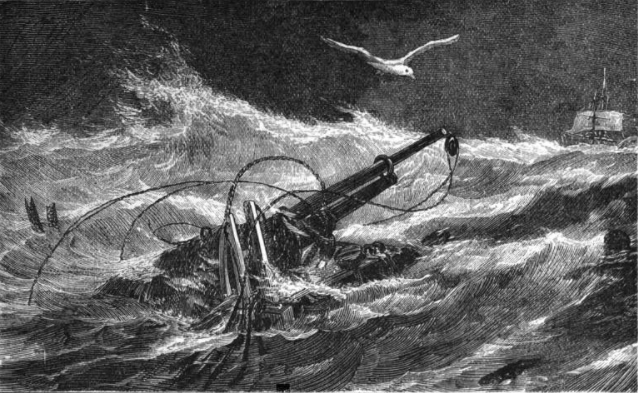Note: This article has been excerpted from a larger work in the public domain and shared here due to its historical value. It may contain outdated ideas and language that do not reflect TOTA’s opinions and beliefs.
“Log of the ‘Nautilus.’" from A Daring Voyage Across the Atlantic Ocean, by William Andrews and James Maculay, 1880.
Tuesday, July 16th.—Wind E. and variable; very light. Saw five sails going to westward. Got observation. Lat. 46.49 N., long. 27.25 W. Get some wind in afternoon, but it shifts frequently, blowing in strong gusts. At midnight saw green light and shadow approaching off the starboard bow. Showed my light (which I keep under the seat now for two reasons—viz., we get the heat from it and can see more distinctly), and bore down on him, but he bore away from me, taking me for a steamer or a nondescript; but I gave chase, and getting over their scare, they hove to. I ran alongside and explained things. She proved to be the Norwegian barque ''Franc," Captain Petersen; gave long. 25. W.
The captain knew my friend Modie in Boston. Also had read of us in the papers. Could not make us out. Had to rub his eyes a long time before he would believe that he was awake, and that we were really a legitimate Yankee craft. Wanted us to come on board, but we declined, and bidding him good-bye, shot under his bow, and in a moment. were lying our course (which took him fifteen minutes to do), and were ready to "pass along another one." For the last week my chronometer watch has been useless to me, refusing to stay wound, something having given out inside of the works, leaving me without longitude or time of day—a very bad mishap.
Weather predictions by our barometer (my judgment) fair, set fair. Course E. by S. half S.
Sea Serpent Story. — Wednesday, July 17th.—Wind S.S. W.; course E. by S. half S.; sea smooth. These good weather spells kind of knock spots out of our ideas of making a quick passage. Just thirty-four days out. I never took much stock about sea serpents, but I have good reason to believe, after what I saw last evening, before dark, that there are denizens of the deep that have never been thoroughly explained or illustrated by our zoological societies.
It was during a moment of intense calm, and I had been watching some whales sporting and spouting at a short distance behind me, when, on turning and looking in the opposite direction, I was startled to see what appeared to be a part of a huge monster in the shape of a snake; it was about two hundred feet off. I saw twelve or fifteen feet of what appeared to be the tail of a huge black snake from five to fifteen inches in diameter, the end being stubby, or round, and white. It was in the air in a corrugated shape in motion, and in the act of descending. I also saw a dark shadowy form in the water corresponding with the tail; also the wake on the water as if more had just gone down, the whole being in motion after the manner of a snake; also heard the noise of the descending part, and saw the splash on the water.
Walter being just at that moment at the cuddy, where I keep the hatchet, getting some tea for supper, I told him to pass me the hatchet quick, which he did. He heard the splash and saw the form in the water. I wanted the hatchet, not because I thought I should have to use it, but because I thought it would be a good thing to have it handy, in case I should want to use it. Walter had a swim an hour before near the boat, and the thought of sea serpents being around kind of took away his relish for that kind of sport for the present.
During the night we heard from time to time the most horrid noises behind us that we have ever heard on the water—splashing and breathing in a loud wheezy manner, but that we took to be whales. This morning we saw and heard whales beating the water with their tails three miles off, throwing the water to a great distance in the air. We thought if they only saw fit to give the "Nautilus" one of those blows, that would settle our case here and save funeral expenses.
Thursdays July 18th. — Wind light, E. and S.E. At daylight saw three sails on horizon bound to westward. We spoke the middle one, the British brigantine "Nellie Crosby," of Yarmouth, N.S., Captain Bain, from England to Baltimore, Md., long. 24.30 W. Invited us on board to breakfast. Had a very sociable time; furnished us with a few luxuries we were in need of. No observation; rather chilly; we make but little easting. Last night Walter was taken with haemorrhage, coughing up considerable quantities of blood; he said he felt better after it apparently ; continued bleeding through the night at intervals. We made about thirty miles. Captain Bain said he had seen several sea serpents.
Friday, July 19th.—Light easterly winds, and we make considerable leeway; course doubtful. Passed between a brig and a brigantine about 8 a.m., bound west. Did not feel like speaking either of them, as we are in want of nothing but land. Fortune seems to have been against us from the send off, and we have given up all hopes of a quick passage. For twenty-six days the "Nautilus" did not rest a moment that she could sail; but our ignorance of certain localities, and having to heave to so often, everything being saturated with water, discouraged us. A quick passage is possible now, but not probable. Our health has been good beyond expectation, outside of Walter's haemorrhage (I hardly understand that—he says he feels better every time after bleeding), neither of us being unable to perform our respective duties.
Although with a little reluctance for a moment sometimes, did we turn out of our "cubby hole" into the cold wet storm and dense darkness with fog, for eighteen consecutive days and nights that we passed without sun, moon, or stars to cheer us, to perform our task of four hours or more at the helm, to keep our faithful look-out before and behind, and to watch the compass with the utmost scrutiny without having been fairly-asleep; and if sleep did come it was disturbed by dreams of a restless imagination that we were even then on duty, and had been for a week, and about to be relieved, instead of being off duty and about to go on.
No observation to-day, old Sol not turning out till too late, and then only showing the outlines of his welcome countenance. Course north by east. A few whales put in an appearance, and seemed to wonder what kind of a young visitor had dared to disturb the sanctity of their reservation. But seeing that we were decorous, no doubt they concluded to be so likewise, and permitted us to loiter around. While working out dead reckoning, a grampus, twenty-five feet long, gave us his unpleasant company, often coming within a few feet of us. Of course my little hatchet had to be brought into requisition. I made the remark to Walter that it was laying off our course under difficulties when we had to keep side-arms on top of the chart. He had numerous scars on his hide, reminding me of previous combats with foes no doubt, and I told him two were company enough for us and three a crowd, and that his room was better than his presence. At his departure I was relieved.
Wind W. Two ships ahead bound W. Changed our course to speak them. The first was the American ship "Annie H. Smith," of New York, Captain Roderick, from Hull, England, to New York, U.S.A. Lat. 48.06 N.; long. 24 W. Gave us his best wishes for success, and his last words that I could hear were, " Bully for you." The other was the British barque "J. B. Duffus," Captain Buckley, bound to Philadelphia, Penn. He said that he did not want to go to Havre with us. Wind N.E. ;we stand to the southward. The bottom of the " Nautilus" is covered with barnacles, retarding our headway considerably. Passed two more ships in the night; tried to speak one of them, but he was afraid, and ran off. Walter’s haemorrhage is worse. Walter says he is not afraid to die, but he wants to get over first.
Saturday, July 20th. — Wind variable, all easterly and light. No observation to-day. Picked up six feet of the figure-head of some vessel; it was gilded and very handsome. No sails to-day. Rainbow in the morning, sailors take warning. "Scotch mist" and foggy, off and on. There is one thing certain; if we are not old sailors, we are old salts, our clothes being full of salt. The porpoises had great fun with us this evening, jumping out and falling on their backs and everyway possible for them to. Run and course for the land somewhere. Walter's haemorrhage continues. You can imagine my thoughts under the circumstances.
Sunday, July 21st. — Wind N., light and foggy. I managed by considerable perseverance to steal an observation to-day. Lat. 47.58 N.; long., dead reckoning, 20.30 W. Observed the Sabbath with one usual custom of our town, viz., baked beans and coffee for breakfast ; we had no brown bread, the baker did not come round, and we could not get to Elm Square or Stickney's (at Beverly), so we made a virtue of necessity. Course E. by S, Five sails, and a few whales : "A rhyme, if you take it in time."
Plenty of tide-rips these twenty-four hours. We are working up to the course of the West Indiamen home to England for a change. Run about eighty miles. Spoke American barque "C. L. Carney," of New York, Captain Jackson, from New York to Dunkerque in France, with a cargo of kerosene oil. Went on board, took lunch and supper, and had a splendid time, the captain sparing no pains in our behalf, and will always be in my esteem a gentleman. Captain Jackson gave Walter a bottle of Friar's balsam, which stopped his bleeding after that, In the evening, a breeze springing up from the westward, I returned to the "Nautilus" and shot ahead of the barque, telling them I would report them in France, creating laughter; but the wind increasing I was compelled to soon follow in his wake, which I did for an hour, a lively conversation passing. But the large waves soon made me fall behind, to my regret.
Oh, bury me not in the deep, deep sea; These words came low and mournfully At the close of the day, &c.
Monday, July 22nd. — Wind fresh from the south. Plenty of sails in sight. Going E. and W. Spoke British barque " Lizzie J. Leslie," of Liverpool, N.S., bound to Liverpool, England; lat. 47.22 N.,long. 18.30 W., Captain Holbrook. Asked if I had my reckoning. Told him I had, and gave it to him. He said it was about right. Spoke German barque "Alster," of Hamburg, from
New York to Hamburg, Captain Switzer. Spoke Norwegian barque "Floke," of Stavanager, Captain Englebretzen. Spoke American barque "Albina," of New York, Captain Goodfellow, bound to the port of Dunkerque, France. Spoke British ship "Annot Lyle," of Liverpool, England, from New York to Cork, Ireland, Captain Hinckley. At night it came on thick, and rain is no name for it. Oh, how it did blow! Hove to under sail at midnight. Chop sea running. Wind W., changed to N.N-W. Got under way again at 3 a.m. Run 215 miles. How is that for high speed?
Andrews, William A. and James Macaulay, A Daring Voyage Across the Atlantic Ocean, E. P. Dutton and Co.,1880.
About TOTA
TOTA.world provides cultural information and sharing across the world to help you explore your Family’s Cultural History and create deep connections with the lives and cultures of your ancestors.




